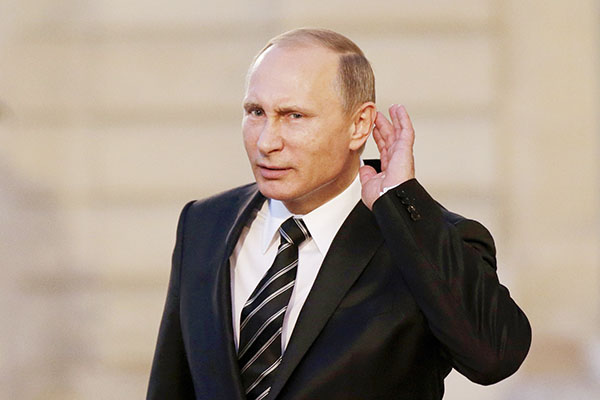Sensible strategic move by Russia to give Assad support
Updated: 2015-10-14 07:30
By Wang Hui(China Daily)
|
|||||||||||
 |
|
Russian President Vladimir Putin cups his ear to listen to a question as he departs after a summit on the Ukraine crisis at the Elysee Palace in Paris, France, October 2, 2015. France hosted a meeting with leaders of Russia, Germany and Ukraine in Paris for talks about Ukraine which were likely to be overshadowed by the conflict in Syria. [Photo/Agencies] |
Russia's direct military involvement in the fight against the Islamic State group in Syria could have a far-reaching impact on both international anti-terror efforts in the Middle East and the political terrain in the region.
Russia began airstrikes on IS targets in Syria on Sept 30 at the request of Syrian President Bashar al-Assad. The move has drawn widespread suspicion and criticism from Western countries which believe Moscow is backing its long-term ally Assad and helping the latter to combat the country's rebels.
Yet, there is no denying that Moscow's military involvement is a sensible strategic move in response to the ineffectiveness of United States' strategic maneuvers in the region in the past few years.
To some extent, persistent US support to arming moderate opposition forces in the Middle East and its half-heartedness in fighting the IS group have aggravated Russia's security outlook and reduced the strategic space of its allies in the region.
The US support to rebel forces in Syria has enabled extremist and terrorist groups to flourish in the region; some tens of thousands of extremists have entered the crisis-ridden countries in the Middle East from Chechnya, Russia's North Caucus and Central Asia.
With the Syrian government losing the control of 70 percent of its territory, the fall of the Assad government may not be a distant illusion. And if such a scenario truly happens, the fledgling anti-Russia forces in the Middle East could pose a tangible threat to Russia. On Tuesday insurgents fired two shells at the Russian embassy in the Syrian capital.
As a result, for Russia, supporting Assad is tantamount to bolstering its own stability and security.
Its involvement is also helping to strengthen its image as a responsible stakeholder.
Syria has been mired in a civil war for more than four years, and the US-led international coalition has been bombing IS positions in Syria and Iraq for more than a year.
From the perspective of combating terrorism in the region, Russia's involvement, at the invitation of Assad, could make up for the ineffectiveness of the international coalition in the fight against IS extremists. With the cooperation of Syrian government ground forces, Russian strikes against the IS group could prove more efficient and precise.
However, from a geopolitical perspective, Russia's involvement signals Syria has become a venue for a power tussle between Russia and the US.
Since the civil war broke out in Syria, the US and its allies have been providing weaponry and military aid to the rebel forces in Syria while Russia has been granting military support to the Assad government.
Now that both Washington and Moscow have directly involved themselves in the fight against the IS group in the Middle East, the power struggle in the region will only be intensified. For one thing, military intervention could boost Russia's influence in the region and make it a force to counterbalance the US' clout in the region.
As the Syria crisis has dragged on, the spillover from the crisis continues to affect more countries in the Middle East and beyond.
The ongoing refugee crisis in Europe and Saturday's deadly terror attack in Ankara, the Turkish capital which claimed the lives of at least 97 people, are examples of the Syria crisis spilling out beyond the borders of that country.
Russian President Vladimir Putin said on Sunday that the objective of the Russian operation was to "stabilize the legitimate authorities and create conditions for finding a political compromise".
Indeed, a political solution to the Syrian crisis is the best way to end the unrest in Syria. To this end, the international community should push for a third Geneva conference on Syria to be held as soon as possible.
The author is a senior writer with China Daily. wanghui@chinadaily.com.cn
Related Stories
Russian president and Saudi defense minister agree to cooperate in Syria 2015-10-13 07:45
Russia's military intervention in Syria reaps initial gains 2015-10-12 07:37
US pulls plug on Syria rebel training effort; will focus on weapons supply 2015-10-10 07:10
Russian aircraft in Syria violates Turkish airspace because of bad weather 2015-10-06 08:14
Today's Top News
Xi's trip to herald 'golden decade' for relations
Wanda's chairman Wang again becomes richest Chinese
Ex-NBA star Odom reported critical, Kardashian at his side
Country house to add English tradition to Xi, Cameron meeting
Most Chinese cities failing air quality standards: Report
Xi to initiate 'golden era' in China-UK ties
China's September inflation cooler than expected
Sensible strategic move by Russia to give Assad support
Hot Topics
Lunar probe , China growth forecasts, Emission rules get tougher, China seen through 'colored lens', International board,
Editor's Picks

|

|

|

|

|

|






